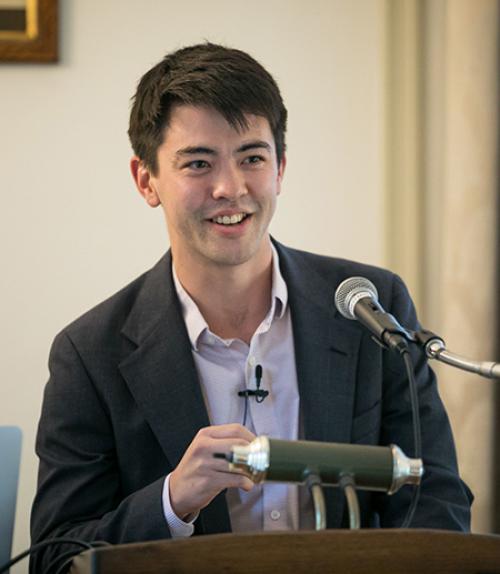Looking at U.S. news coverage, there’s one thing that all media outlets seem to agree on – our country’s divisions today are worse than they’ve been in a long time. As a result, people are asking questions such as: How can we empathize with people who are different than we are? How can we listen to them? Really understand them? Help them to understand us?
Those are some of the questions that Ryan Quinn ’18 faces every day in his work in New York City as a political analyst with SwingLeft, an organization working to elect progressive candidates across the country.
And they are the same ones he faced in 2018, as a worker on the campaign of Tracy Mitrano J.D. '95, who ran for Congress in New York’s 23rd district against Republican Tom Reed.
Quinn visited campus Sept. 19 to talk about the experience of working on a local campaign, and more deeply, what he has learned about relating to people. He spoke as a guest of the Rural Humanities Initiative, a scholarly project funded by The Andrew W. Mellon Foundation that is investigating the complex dynamics between rural and urban life.
Along with bringing speakers to campus, the initiative will offer a semester long seminar in the spring for advanced undergraduates and graduate students that will be a mix of theory and practice. It will also host an intensive Rural Humanities practicum for advanced undergraduates and graduate students.
Growing up in San Francisco, Quinn said his experience with the 23rd district was a great introduction to the issues facing more rural areas.
“I knew I wanted to be a part of the midterms,” said Quinn, who majored in government and minored in international relations and law and society. “I loved Ithaca and wanted to learn more about the area.”
Quinn discovered that the 23rd congressional district is a mixture of various constituencies – post-industrial cities, rural agricultural communities and college towns, he said. The map looks like one blue square of Tompkins County, surrounded by 10 red surrounding counties, he said. But that’s missing a bigger picture.
“When we paint everyone with a flat red or blue color, we alienate voters and fail to understand why they’re voting the way they are,” he said. Some of the most important topics for people in New York’s rural areas — health care coverage and dairy farming subsidies — cross political lines and became the top areas of focus for the Mitrano campaign. “There is much more of America that looks like the 23rd district than we realize.”
Quinn said his experience working on campaigns have taught him a lot about leading with empathy and having deep discussions with people to find out why they feel the way they do.
“It’s important to engage with ideas that may be uncomfortable to you,” he said, ”to open the door rather than shut it off entirely.”
Quinn, who now works on a national level to support progressive candidates, said his interest in government and politics emerged during his time at Cornell, when he realized he wanted a career with social impact, but didn’t want to follow the premed track he thought he might want to pursue.
“Interacting with policy and how political decisions change people’s lives became the most important things for me to study,” he said. “Through my humanities classes, I learned the skill of how to be intellectually challenged by an idea I had not previously considered. That has been really valuable in how I continue to think about issues.”




